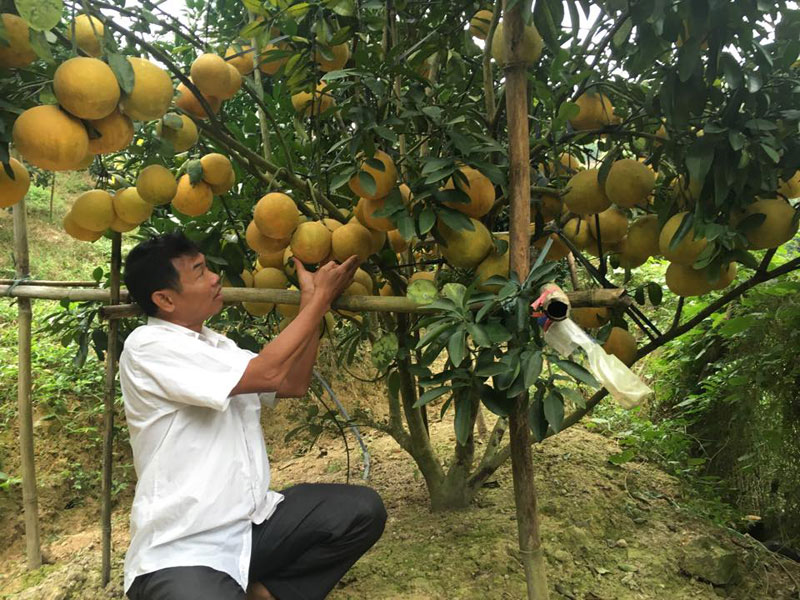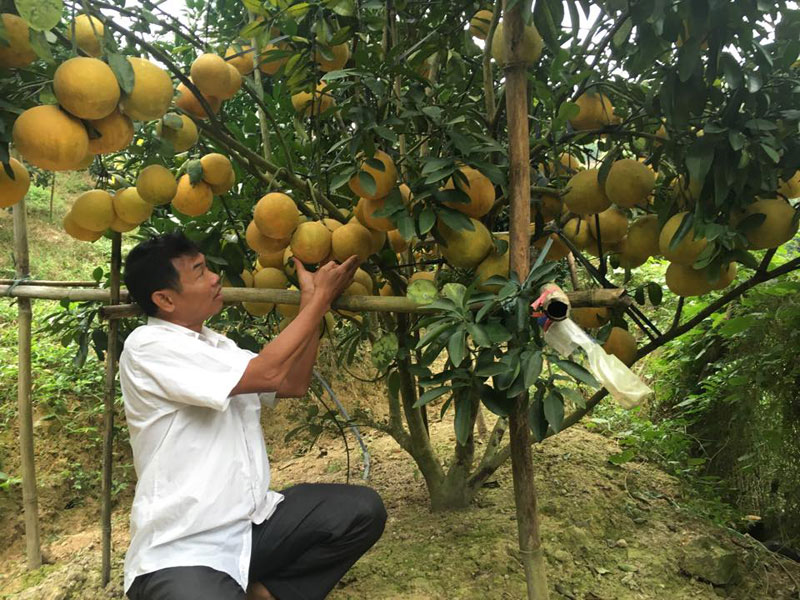



Mr. Pham
Khac Thuong, Village 3, Tu Ne commune (Tan Lac) is the pioneer in the movement
of planting red grapefruit on the hill.
Before reaching
the decision of planting red grapefruit on the hill, this land had been known
as difficult area, no water resources, only acacia trees could survive there.
Some people said that he was so reckless but in fact when he made his decision,
he had discussed thoroughly with his family. He explored by himself, saw that
about 2 km away, there was a stream flowing around the year. This would be the
water resources needed for him to implement his determination of planting red
grapefruit on the hill.
Therefore, with the consensus and support from his family, he cut the acacia trees, renovated the land, and transferred to plant red grapefruit. That happened in 2012, at the beginning he had to face with a lot of difficulties due to lack of capital and technique, he also had to self- studied, researched information from the famous grapefruit planting households inside and outside the commune. Step by step, with his patience, together with the contribution of his siblings, Mr. Thuong has built up 5 hectares of red grapefruit, green grapefruit and oranges, in which the main area is for planting red grapefruit. Planting red grapefruit cannot be done without water, so he uses large capacity pumps, invests in the water transmitting system from the stream to the reservoir to supply water for irrigation. About fertilizer, he uses the manure sources which have been dehumidified to have grapefruit with best quality.
The crop of 2017 is the first one Mr. Thuong officially harvested with about 300 red grapefruit trees. The grapefruits are all round, yellow, abundant which is the result of his careful work in the whole 5 years. Mr. Thuong said: from now until the end of the harvest, I can get about 3,5 – 4 thousand grapefruit with the average price of 20.000 dongs/ one; the revenue is estimated about 700 million dongs. When introducing to the markets inside and outside of the province, his red grapefruit is popular because of their same sizes, full grapefruit citrus, the beautiful red color, sweetened taste, shredded and non-stick citrus.
At present, following Mr. Thuong’s way, dozens of farmers in the commune bring the red grapefruit to plant on the hill; the area of grapefruit planting has increased to dozens of hectares. The household overcome the water irrigation by building reservoirs, water pumps from other resources, implementing the process of water irrigation to ensure that the plants grow well.
With his initial, the area of red grapefruit planting in the commune has developed rapidly, becomes a movement of planting red grapefruit on the hill, which can create a large merchandise area.
And from here,
the commune has built a Cooperative to produce, process and consume red
grapefruit of Tan Lac, Hoa Binh in Village 3 and 9 with 9 members, Mr. Thuong
plays a role of Director. Tan Lac red grapefruit has just been certified of
Group Brand and with his effort, Mr. Thuong manages well the production and
business of the cooperative. It now has 1 shop for introducing and selling red
grapefruit at Zone 3, Muong Khen town. The cooperative also implements to
inter-consume red grapefruit for farmers. It is the first cooperative of the
province to exploit the pre-processing technology, product packing, bringing
the members’ products to consume in the markets of Ha Noi, Hai Phong, Bac Ninh
and some southern provinces.